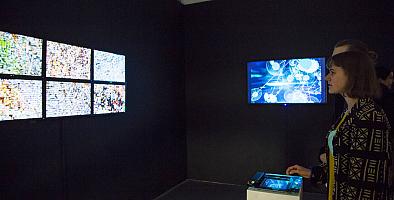MRes
Anthropology
Content navigation menu
Why study MRes Anthropology at Goldsmiths
This programme offers advanced training to students who intend to undertake a doctorate in anthropology, and it presents a valuable standalone research degree in and of itself that allows students to apply for researcher positions.
- Students applying for the MRes in Anthropology need to have a BA or an MA and need to provide a written research proposal the department can assess.
- The MRes is a taught degree that provides training through classes and close supervision, which will enable you to develop your own research proposal and complete training modules that will support your intended project.
- Having accomplished the degree you will be able to design and conduct research based on qualitative and quantitative methodologies.
- The MRes provides you with insights into social science research methods, and in-depth training in ethnographic methods and issues around anthropological research, including ethics and practicalities of undertaking fieldwork, as well as basic quantitative training.
- The MRes is a standalone degree programme where students may choose to develop professional research skills. Other MRes students use this as a training year for the MPhil/PhD programme in order to refine their proposal and to acquire necessary skills to conduct research in anthropology.
- The taught elements of the programme include modules on research design; ethnographic methods and quantitative methods; and opportunities to audit a wide range of courses in the department, the university and across the University of London.
Contact the department
If you have specific questions about the degree, contact Dr Henrike Donner.
How to choose between MRes and MPhil/PhD
All research students are encouraged to register for the MRes in order to complete the requisite training for carrying out a doctoral research project in anthropology, regardless of whether they hold a degree in anthropology.
Students who complete the MRes successfully will transfer to MPhil status after completing the dissertation (usually in September) and register for the MPhil/PhD degree afterwards.
However, if you hold an MA in Anthropology with a substantial methods training component it is possible to register directly for the full-time MPhil programme, provided the department and your future supervisor(s) agree after interviewing you.
MPhil-registered students are expected to audit the courses available to the MRes students and present assessed material similar to the MRes dissertation during their first year to be upgraded to PhD status.
Only after they have been upgraded successfully can they start fieldwork or other forms of data collection.
Students cannot be registered as PhD students without having gone through this process.
What you'll study
In the week before the beginning of the academic year in mid-September there is an Induction Programme for all new research postgraduates at Goldsmiths.
You will be introduced to Goldsmiths-wide and departmental facilities and procedures, and attend workshops on what is involved in doing a research degree.
The MRes is a training year, in which work on your own research project is coupled with general training in anthropological and social science methods – run both within the department and by the Goldsmiths Research Office – as follows:
- Doing Ethnography (10 weeks x 2 hours)
- Research Design (10 weeks x 2.5 hours)
- Either: Quantitative Research Methods (15 sessions of 2 hours each) or optional modules
- Department of Anthropology Research Seminar
You may also take other modules depending on your specific training needs – such as learning a language, or auditing an MA course – either in the department or elsewhere, of particular relevance to your research project.
At the end of the year, MRes students present a dissertation in September, which discusses in depth their proposed research topic and the relevant literature.
Other opportunities
You are also encouraged to attend seminars in other parts of the University of London, attend conferences, and go on outside modules such as those organised by GAPP (Group for Anthropology in Policy and Practice). There are departmental funds to enable you to attend such events.
Assessment
The taught modules are assessed individually and the final assessment is a dissertation.
Careers
The MRes will train you in general social science and discipline-specific research methods so that you can carry out research in anthropology to doctoral level.
The programme prepares students for careers in generic social scientific research, and in anthropological research in particular.
Skills
Our MRes programme will enable you to:
- Gain a thorough knowledge of the main methods used by anthropologists
- Understand the principles of quantitative and qualitative research in the social sciences
- Plan, design and present a research project
- Evaluate the research of others
- Develop professional research skills
Entry requirements
Most direct entrants to the MRes or MPhil already have a first degree or an MA in Social Anthropology.
If you don't have this, and you do not want to take one of our MA courses, you should apply to the MRes, which acts as a qualifying year conversion course for the MPhil/PhD programme, but is also a stand-alone degree.
If you achieve the required standard, you can apply to register for the MPhil/PhD.
International qualifications
We accept a wide range of international qualifications. Find out more about the qualifications we accept from around the world.
If English isn’t your first language, you will need an IELTS score (or equivalent English language qualification) of 6.5 with a 6.5 in writing and no element lower than 6.0 to study this programme. If you need assistance with your English language, we offer a range of courses that can help prepare you for postgraduate study.
Fees and funding
Annual tuition fees
These are the PG fees for students starting their programme in the 2025/2026 academic year.
If your fees are not listed here, please check our postgraduate fees guidance or contact the Fees Office, who can also advise you about how to pay your fees.
It’s not currently possible for international students to study part-time under a student visa. If you think you might be eligible to study part-time while being on another visa type, please contact our Admissions Team for more information.
If you are looking to pay your fees please see our guide to making a payment.
Funding opportunities
Explore the Goldsmiths scholarships finder to find out what funding you may be eligible for.
ESRC/SENSS Doctoral Studentships
Fully-funded ESRC studentships are available to research students via this Doctoral Training Partnership (DTP). Find out more about the ESRC/SENSS Doctoral Studentships.
Paying your fees
Find out about paying your tuition fees.
Additional costs
In addition to your tuition fees, you'll be responsible for any additional costs associated with your course, such as buying stationery and paying for photocopying. You can find out more about what you need to budget for on our study costs page.
There may also be specific additional costs associated with your programme. This can include things like paying for field trips or specialist materials for your assignments. Please check the programme specification for more information.
How to apply
You apply directly to Goldsmiths using our online application system.
To complete your application, you will need to have:
- Details of your academic qualifications
- The email address of your referee who we can request a reference from, or alternatively a copy of your academic reference
- Contact details of a second referee
- Copies of your educational transcripts or certificates
- A personal statement
- Details of your research proposal
You'll be able to save your progress at any point and return to your application by logging in using your username/email and password.
Before you apply for a research programme, we advise you to get in touch with the programme contact, listed above.
It may also be possible to arrange an advisory meeting.
Before you start at Goldsmiths, the actual topic of your research has to be agreed with your proposed supervisor, who will be a member of staff active in your general field of research.
The choice of topic may be influenced by the current research in the department or the requirements of an external funding body.
If you wish to study on a part-time basis, you should also indicate how many hours a week you intend to devote to research, whether this will be at evenings or weekends, and for how many hours each day.
Research proposals
Along with your application and academic reference, you should also upload a research proposal at the point of application. This should be in the form of a 2-5 page statement of the proposed area of research and should include:
- Delineation of the research topic
- Why it has been chosen
- A section on methodology
- A brief list of major secondary sources
How detailed a research proposal are we looking for on the application form?
Obviously what you put on the form and exactly what you end up researching may be rather different, but in order to judge whether or not to offer you a place, the department needs to know whether you have the broad outlines of a viable project. This means:
- A project that is both worthwhile and interesting, but not over-ambitious
- A project that can realistically be achieved within the confines of PhD on a full-time (four years typically) or part-time (six years maximum) basis
- We need to be sure that you have thought about it carefully and are fully committed to the research
- We need to be sure that you understand what is involved in doing a PhD
- Your research proposal should give us enough information to be able to interview you (if you are in the UK) or reach a decision as to whether to admit you if you are not based in the UK
When to apply
We accept applications from October for students wanting to start the following September.
We encourage you to complete your application as early as possible, even if you haven't finished your current programme of study.
It's very common to be offered a place conditional on you achieving a particular qualification.
If you're applying for external funding from one of the Research Councils, make sure you submit your application by the deadline they've specified.
Selection process
Once we receive your application form, it is forwarded to the Postgraduate Convenor, who normally sets up a formal interview with two other members of staff with relevant expertise. You may wish to contact the convenor as well.
At the interview you will be asked about your academic background and to elaborate on your plans for research, and you can also ask questions.
Further guidance
Read our guide to applying for a postgraduate degree at Goldsmiths.






